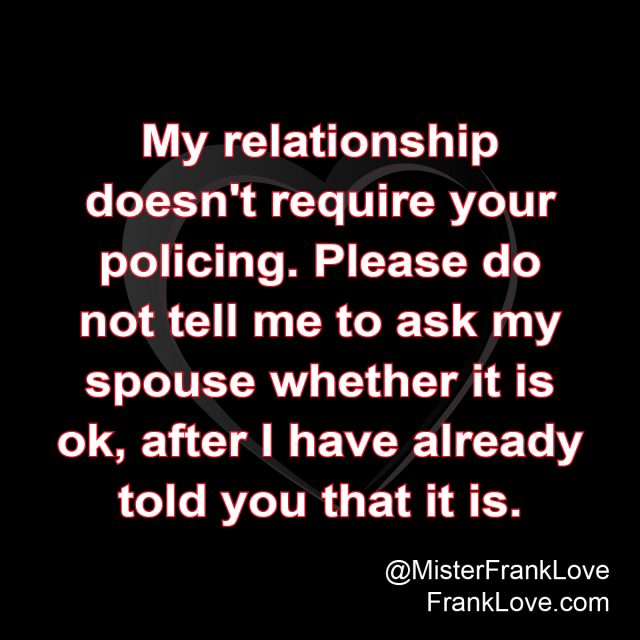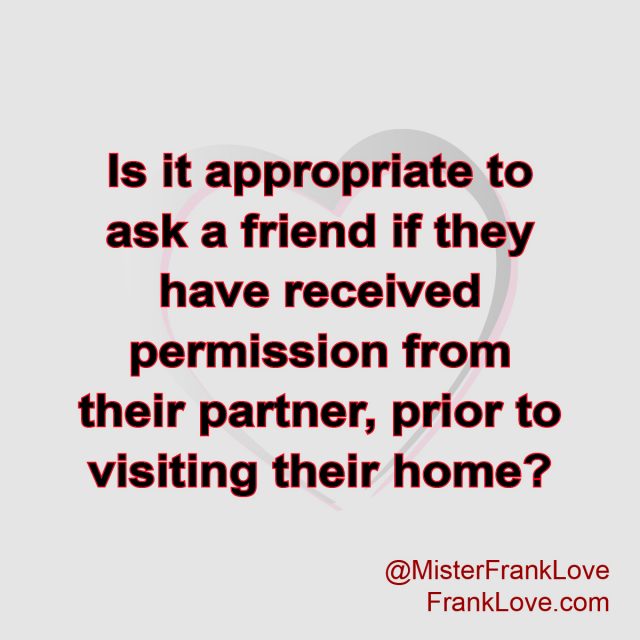
In my previous blog, “I Get To Vs. I Have To,” I talk about the power of word choice in reflecting how much control we have over our actions.
We can probably agree that it’s best to stay out of other people’s relationship problems. But sometimes we might meddle without realizing it. Consider the seemingly innocuous question “Did you ask your wife?” Personally, I find that question irritating and insulting.
I recently had two experiences where I was triggered in this manner. I had invited some people to my home, and one person said, “Make sure you ask your wife. We want to make sure it’s OK with her.”
On a different occasion, my family had been invited to someone’s home. I accepted the invitation, and the host responded, “Run it by your wife and let me know.”
I believe neither person harbored any ill intention by expressing their concerns. However, I was triggered and wanted to say to each of them, “Please do not interject yourself into how my wife and I communicate and work with one another. We’ve got this.” Or, “Mind your mutha******* business.” I definitely did not say the latter.
I was triggered because the comment reflects what I consider to be an assumption about my relationship (i.e., that my wife and I have conversations of that nature with one another). And if that is our culture (and it might not be), they’re assuming I needed prompting or a reminder to communicate with my wife. It felt insulting.
In a different, albeit related, example, River and Jordan are five years married. Jordan enjoys company coming to the house frequently. River is amenable to having house guests but prefers selecting days when company comes and preparing the house so that it is “suitable” before guests arrive.
Because of River’s preference, River wants Jordan to ask in advance so River can weigh in on whether it’s a good time and if they have adequate time to prepare the house. While Jordan understands (and is often compliant and respectful of River’s desire), sometimes Jordan doesn’t give the requested notice.
To address this, River asked Kennedy, Jordan’s close friend and a frequent visitor, to let River know when Kennedy and Jordan have planned for Kennedy to come by the house. When making this request, River explained to Kennedy, “You-all’s decision may have an effect on me.”
River’s request of Kennedy is a potential problem because River is indirectly informing Kennedy that there is a breakdown in communication between River and Jordan. It’s as if River’s saying, “The information sharing between Jordan and me is not to my liking. So before you take Jordan’s word about your presence being welcome, consult with me.”
Since every decision one partner makes has a potential effect on the other (from crossing the street to having a party at our home), ideally both partners will have a direct or indirect sense of whether or not the other partner is in support of a specific action. However, the way parties within a relationship consult with one another is best left to the parties within that relationship.
The way parties work together and communicate does not need to be vetted by outsiders. Individuals in a relationship may talk to each other before making a decision. They may also give a proverbial blank check to one or both by agreeing something like “Any decision you make about money will have my full support.” Or they may not talk to or consult one another and agree that each is free to do their own thing. The dynamic between partners can be one of these or many others. It is not our place to get in the way of another couple’s communication. (Though it may be our place to get out of the way of it.)
Communication challenges come with the territory of being in a relationship and getting to know another as we encounter various phases that we individually and jointly deal with over the years and possibly decades together. When we have a communication challenge, it’s not necessary or healthy for our relationship to involve others, especially without the consent of our partner. And it’s not necessary or healthy for us to interject ourself into another couple’s relationship, as I described my friend doing to me.
Ideally, we resolve any communication issue inside our relationship. This does not, in any way, suggest that outside help may not be valuable to the health of our relationships. Relationship coaching is the point of this blog; providing value to my readers is my goal. However, if a person is reading this for support, they are not interacting directly with the author or directly involving a third party.
When we directly seek the assistance of a third party, it is important to get the support of our partner first. This means that our partner has bought in to a third party supporting our relationship. Without that mutual agreement, involving a third party can reasonably be considered a betrayal. To avoid this betrayal, let’s work with our partner one-on-one to resolve our issues without involving anyone else. If we require the support of someone else, let’s get it with our partner in full agreement.
first. This means that our partner has bought in to a third party supporting our relationship. Without that mutual agreement, involving a third party can reasonably be considered a betrayal. To avoid this betrayal, let’s work with our partner one-on-one to resolve our issues without involving anyone else. If we require the support of someone else, let’s get it with our partner in full agreement.
And remember that when we bring someone else into our relationship, we also bring their issues and their agenda too. This often complicates matters. Work to keep things simple.
As we work to make sense of the challenges that so many of us face in our relationships, let’s keep in mind that we are also teaching people outside of our unit. We are teaching them how to treat us as individuals, how to treat our partner, and how to treat our unit.
Use these teachable moments (like being asked to check with your partner before confirming plans) to note that we will work together to make decisions and resolve any challenges we may encounter without the unsolicited help of outsiders. And if help is requested or needed, WE will ask for it. It is a way of protecting our union and our partner . . . and that’s loving.
Keep Rising,
Frank Love
In my next blog post, “Impatient Communication: Interrupting, I will take a look at how partners in loving relationships can improve their communication skills by tamping down impatience when it creeps into how we talk.
Watch Frank Love’s presentation “The Act of Caring.”
Subscribe to receive Frank’s weekly blog.
Become a sponsor of Frank Love and his work creating loving cultures in our relationships with a monthly contribution of as little as $2. Sign up today at Patreon.com/FrankLove.
–—–—–—–—–—–—–—–—–—–—–—–—–—–—–—–—––
Each week, Frank Love hosts Zoom support group meetings that assist women and men as we work to create a loving culture in our relationships. Calls occur from 7 p.m. to 8:30 p.m. EST and can be accessed by visiting FrankWeeklyCall.com.
- Tuesdays—Black Women: Creating a Loving Culture in Our Relationships
- Thursdays—Black Men: Creating a Loving Culture in Our Relationships
–—–—–—–—–—–—–—–—–—–—–—–—–—–—–—–—– –
Frank Love coaches individuals toward creating a loving culture in their family. He is also the author of Relationship Conversations You Don’t Want to Have (But Should Anyway) and 25 Ways to Be Loving. To schedule a free consultation, contact Frank at Frank@FrankLove.com.


4 comments
PeriodicReader
June 27, 2022 at 12:12 PM
Hmmmm….Both parties could potentially be projecting their own experiences. I prefer thinking questions are generally not Intended to insult unless it’s done to be milicious. In your examples, that was not or perceived to be the intention. It is possibly your lack of care and communication that could be your trigger. Possibly, you’ve had this talk with your spouse and somehow it hits a nerve. It seemed like a sign of respect to you and your spouse. If not needed in your relationship then a simple reply is sufficient.
Frank Love
August 24, 2023 at 11:13 PM
You raise an interesting point about why I might be triggered. I am considering and will consider.
Most of us have concepts of what we feel is an over-reach when someone is communicating with us or when we are communicating with someone. If I witness you walking out of the restroom and ask you did you wipe thoroughly or did you wash you hands, you could just answer both questions and keep it moving, but as far as I’m concerned I am out of line. There is a level of confidence that I am comfortable asserting that you know what you are doing in the bathroom that puts me at ease. Either confidence or an understanding that I’m out of my lane. I think that asking my friend whether he has asked his wife if is outside of my lane.
I prefer to inspire him to create a loving culture with his wife. But it is up to him to execute. It’s not up to me to police him. Just my take.
Thanks for your thoughtful response.
Skip
June 28, 2022 at 7:09 PM
Let’s assume good intentions when someone makes a suggestion regarding the care, concern, or advice especially when we consider them friends. Many times eyes outside can see issues that are right under our nose. Can you see a booger hanging from your nostrils? Not unless you are looking in a mirror. Let’s grow into the emotional intelligence of relationships and try to understand if someone expresses his or her boundaries when it comes to communication, let us seek to understand. Ask for context. Why do you have the need for me to check (or rather, let’s change the connotation of that word check to the word discuss) with you when I would like to invite people over, or go somewhere with friends.
Your decision made without my input could encroach upon my freedom to do something else. What if your decision imposed upon me to play hostess by cooking a meal I did not necessarily plan for, or I planned my own event. It could have been my day to have a mental health day, self care routine or do nothing at all but sit in my underwear all day and read or watch a stupid show. I think that when people are in significant relationships married or with their partners there has to be some type of respect and understanding that checking in or communicating or discussing when you’re going to make plans that can and will have impact on the other is necessary and integral to a healthy relationship. There is a reason proverbs mention the However if that types of communications triggers you then it is imperative for you to look within instead of outside and deal with the underlying issues that makes you feel that way in the first place.
Frank Love
August 24, 2023 at 10:59 PM
I’m not sure that my general point has resonated. Communication with our partners is important. There is no doubt about that (as far as I’m concerned). This blog challenges the need or desire for someone outside of a relationship to find out if we have communicated with our partner.